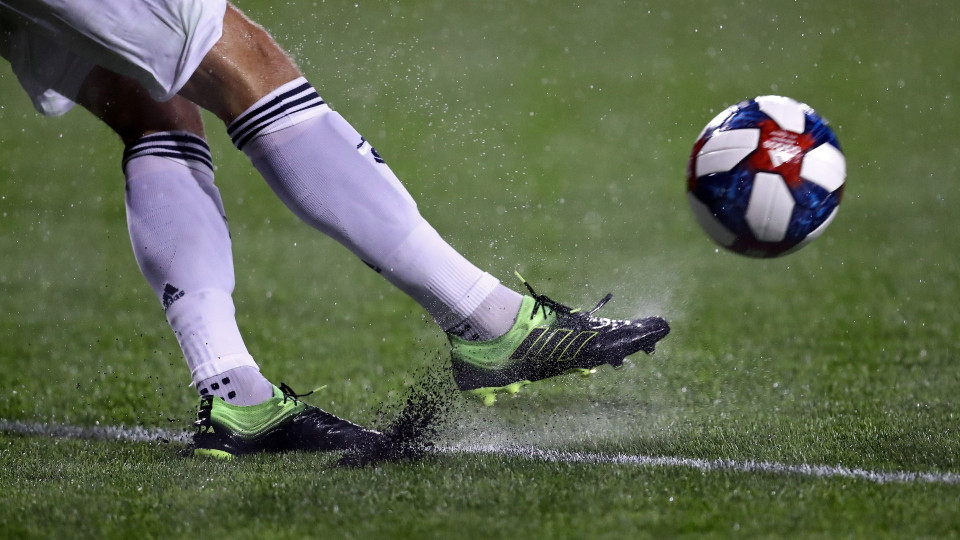25 April: Claques emerge from the "aesthetic revolution" in freedom
Football fan clubs in Portugal emerged after the 25th of April 1974 revolution, within the scope of a "new aesthetic around support for clubs", argues Daniel Freire Santos, a researcher in fan cultures.

© Reuters
A PhD student in History at the Faculty of Social and Human Sciences, at Universidade Nova de Lisboa, Freire Santos is a researcher at the Institute of Contemporary History and currently works on the project "Vou à bola! Culturas Adeptas, Economia Política e Estado na História do Futebol em Portugal (1910-2020)".
The 25th of April 1974, he argues, "allowed the consummation of several types of mobility", but also freedom of expression, association and assembly, allowing fans to relate freely.
"This right of association and assembly is still very present in a decree-law of 1979, for example, in which it was argued that policing in sports events, previously mandatory, would no longer correspond to the designs of freedom in democracy, dictating the end of that same obligation", he recalls.
Even so, this 'freedom' lasts a short time and, in the 1980s, successive governments will seek to "develop much more detailed legislation" for the interior of sports venues, following European directives.
Somehow, the democratic State followed some of the steps "already taken by the dictatorship from the 60s, in a time of greater international pressure".
The tension between fans and the State "has become more complex, at the very least".
"The legislative apparatus that sought to deepen control over the football fan continued to exist and was even intensified, between the late 90s onwards and until today. There is a renewed view of the State, in the last 25 years, regarding the issue of security and organization of sporting events", he comments.
This new view, he adds, "affects the way fans are perceived by political power and how they move to respond to that power".
This state intervention "on the bodies of the fan crowd", as Daniel Freire Santos argues, is the subject of several extensions, in 1998, 2004 and 2009, but also five legislative amendments, the last in 2023, reinforcing a "security line".
For the researcher, this path produces mechanisms that serve more than maintaining public order or a concrete response to international organizations, from Euro2004 to the Champions League finals.
"These transformations also concern the way in which the football industry, in correlation with the central authorities, had to adjust to the increasingly evident commercial elements with the weight of football as a media and marketable spectacle", he says.
Examples of this policy, he argues, are the video surveillance control extended to an increasingly large area or the prohibition of the entrance of banners into stadiums or even the singing of chants that may contain political ideology.
Another topic mentioned was the controversial "fan card", during the covid-19 pandemic, and the vehement responses from fan clubs and other fan associations.
"It seems to be of interest not only to control excess or discipline those who deviate from the norm, but also to make it impossible for the unpredictable to happen. (...) I believe that attacking this unpredictability, which is in much of what we can call 'fan culture', could produce harmful effects and even clash with some of the purposes of the 25th of April", he says.
The New State, explains the researcher, applied the same path in sports as "disciplining social spaces with more autonomous dynamics", such as clubs, thus changing the way a fan could behave.
The inauguration of the Estádio Nacional, in Oeiras, in 1944, allowed the regime to "elaborate on the orderly crowd, subordinate to the authority of the State and hierarchically well-ordered", followed by a legalistic machine of decrees and circulars, directorates-general and other orders, to "maintain the discipline and order of the public", ensuring respect for the maximum authority.
"Certainly, being a football fan involved a mixture of 'imposed self-control' and 'admitted freedom'. (...) My paternal grandfather described to me clandestine meetings, between workshop staff and others from the union, held in the stands of stadiums", he adds.
Today, we know of fans organized to demonstrate against the government, as in Braga in 1953, when a minister canceled the visit when he learned of a 'wait', cases that prove the difficulty of the dictatorship in imposing itself on football fans.
Seguro de vida: Não está seguro da sua decisão? Transfira o seu seguro de vida e baixe a prestação



Descarregue a nossa App gratuita.
Oitavo ano consecutivo Escolha do Consumidor para Imprensa Online e eleito o produto do ano 2024.
* Estudo da e Netsonda, nov. e dez. 2023 produtodoano- pt.com

Descarregue a nossa App gratuita.
Oitavo ano consecutivo Escolha do Consumidor para Imprensa Online e eleito o produto do ano 2024.
* Estudo da e Netsonda, nov. e dez. 2023 produtodoano- pt.com
Recomendados para si
Classificados Auto
Leia Também










Últimas Notícias











| Clube | J | PTS | |||
|---|---|---|---|---|---|
| 1 | Sporting CP | 34 | 90 | ||
| 2 | Benfica | 34 | 80 | ||
| 3 | FC Porto | 34 | 72 | ||
| 4 | Braga | 34 | 68 | ||
| 5 | Guimaraes | 34 | 63 | ||
| 6 | Moreirense | 34 | 55 | ||
| 7 | Arouca | 34 | 46 | ||
| 8 | FC Famalicao | 34 | 42 | ||
| 9 | Casa Pia | 34 | 38 | ||
| 10 | SC Farense | 34 | 37 | ||
| 11 | Rio Ave | 34 | 37 | ||
| 12 | Gil Vicente | 34 | 36 | ||
| 13 | Estoril | 34 | 33 | ||
| 14 | Estrela | 34 | 33 | ||
| 15 | Boavista | 34 | 32 | ||
| 16 | Portimonense | 34 | 32 | ||
| 17 | Vizela | 34 | 26 | ||
| 18 | GD Chaves | 34 | 23 |
| Clube | J | PTS | |||
|---|---|---|---|---|---|
| 1 | Real Madrid | 36 | 93 | ||
| 2 | Barcelona | 36 | 79 | ||
| 3 | Girona | 36 | 75 | ||
| 4 | Atlético Madrid | 36 | 73 | ||
| 5 | Athletic Club | 36 | 62 | ||
| 6 | Real Sociedad | 36 | 57 | ||
| 7 | Real Betis | 36 | 56 | ||
| 8 | Villarreal | 36 | 51 | ||
| 9 | Valencia | 36 | 48 | ||
| 10 | Alavés | 37 | 45 | ||
| 11 | Getafe | 37 | 43 | ||
| 12 | Sevilla | 36 | 41 | ||
| 13 | Osasuna | 36 | 41 | ||
| 14 | Las Palmas | 36 | 38 | ||
| 15 | Rayo Vallecano | 36 | 38 | ||
| 16 | Celta Vigo | 36 | 37 | ||
| 17 | Mallorca | 36 | 36 | ||
| 18 | Cádiz | 36 | 32 | ||
| 19 | Granada | 36 | 21 | ||
| 20 | Almería | 36 | 17 |
| Clube | J | PTS | |||
|---|---|---|---|---|---|
| 1 | Manchester City | 37 | 88 | ||
| 2 | Arsenal | 37 | 86 | ||
| 3 | Liverpool | 37 | 79 | ||
| 4 | Aston Villa | 37 | 68 | ||
| 5 | Tottenham Hotspur | 37 | 63 | ||
| 6 | Chelsea | 37 | 60 | ||
| 7 | Newcastle United | 37 | 57 | ||
| 8 | Manchester United | 37 | 57 | ||
| 9 | West Ham United | 37 | 52 | ||
| 10 | Brighton & Hove Albion | 37 | 48 | ||
| 11 | AFC Bournemouth | 37 | 48 | ||
| 12 | Crystal Palace | 37 | 46 | ||
| 13 | Wolverhampton Wanderers | 37 | 46 | ||
| 14 | Fulham | 37 | 44 | ||
| 15 | Everton | 37 | 40 | ||
| 16 | Brentford | 37 | 39 | ||
| 17 | Nottingham Forest | 37 | 29 | ||
| 18 | Luton Town | 37 | 26 | ||
| 19 | Burnley | 37 | 24 | ||
| 20 | Sheffield United | 37 | 16 |
| Clube | J | PTS | |||
|---|---|---|---|---|---|
| 1 | Internazionale | 36 | 92 | ||
| 2 | AC Milan | 37 | 74 | ||
| 3 | Bologna | 36 | 67 | ||
| 4 | Juventus | 36 | 67 | ||
| 5 | Atalanta | 36 | 66 | ||
| 6 | AS Roma | 36 | 60 | ||
| 7 | Lazio | 36 | 59 | ||
| 8 | Fiorentina | 36 | 54 | ||
| 9 | Torino | 37 | 53 | ||
| 10 | Napoli | 37 | 52 | ||
| 11 | Genoa | 36 | 46 | ||
| 12 | Monza | 36 | 45 | ||
| 13 | Lecce | 37 | 37 | ||
| 14 | Hellas Verona | 36 | 34 | ||
| 15 | Udinese | 36 | 33 | ||
| 16 | Cagliari | 36 | 33 | ||
| 17 | Frosinone | 36 | 32 | ||
| 18 | Empoli | 36 | 32 | ||
| 19 | Sassuolo | 36 | 29 | ||
| 20 | Salernitana | 36 | 16 |
|
Liga Campeões
|
Liga Europa
|
Despromoção
|
|---|
| Jogador | Golos | ||||
|---|---|---|---|---|---|
| 1 | Viktor Gyokeres | 29 | |||
| 2 | Simon Banza | 21 | |||
| 3 | Rafa Mújica | 20 | |||
| 4 | Paulinho | 15 | |||
| 5 | Jhonder Cádiz | 15 | |||
| 6 | Samuel Essende | 15 | |||
| 7 | Cristo Gonzalez | 15 | |||
| 8 | Rafa Silva | 14 | |||
| 9 | Héctor Hernández | 14 | |||
| 10 | Evanilson | 13 |
| Jogador | Golos | ||||
|---|---|---|---|---|---|
| 1 | Artem Dovbyk | 20 | |||
| 2 | Jude Bellingham | 19 | |||
| 3 | Alexander Sorloth | 19 | |||
| 4 | Robert Lewandowski | 17 | |||
| 5 | Ante Budimir | 16 | |||
| 6 | Antoine Griezmann | 16 | |||
| 7 | Vinícius Júnior | 15 | |||
| 8 | Borja Mayoral | 15 | |||
| 9 | Youssef En Nesiry | 15 | |||
| 10 | Samuel Omorodion Aghehowa | 1 |
| Jogador | Golos | ||||
|---|---|---|---|---|---|
| 1 | Erling Braut Haland | 27 | |||
| 2 | Cole Palmer | 22 | |||
| 3 | Alexander Isak | 20 | |||
| 4 | Ollie Watkins | 19 | |||
| 5 | Dominic Solanke | 19 | |||
| 6 | Mohamed Salah | 18 | |||
| 7 | Phil Foden | 17 | |||
| 8 | Son Heung-Min | 17 | |||
| 9 | Bukayo Saka | 16 | |||
| 10 | Jarrod Bowen | 16 |
| Jogador | Golos | ||||
|---|---|---|---|---|---|
| 1 | Lautaro Martínez | 24 | |||
| 2 | Dusan Vlahovic | 16 | |||
| 3 | Victor Osimhen | 15 | |||
| 4 | Olivier Giroud | 14 | |||
| 5 | Albert Thor Gudmundsson | 14 | |||
| 6 | Paulo Dybala | 13 | |||
| 7 | Hakan Calhanoglu | 13 | |||
| 8 | Marcus Thuram | 13 | |||
| 9 | Duvan Zapata | 13 | |||
| 10 | Teun Koopmeiners | 12 |
Newsletter
Receba os principais destaques todos os dias no seu email.
Mais lidas
- Última hora
- Dia
- Semana
-
1
-
2
desporto Arábia Saudita
O gesto de Cristiano Ronaldo após penálti e que está a gerar polémica
-
3
-
4
desporto I Liga
-
5
-
6
-
7
desporto FC Porto
Fernando e Sandra Madureira demitem-se da direção dos Super Dragões
-
8
-
9
desporto Fotogaleria
Há 5 anos, Manchester City fez história com Bernardo Silva a comandar
-
10
desporto FC Porto
André Villas-Boas diz ter recorrido a investidores para pagar salários


Newsletter
Seja o primeiro a saber
Receba os principais destaques todos os dias no seu email.
© 2024 Notícias ao Minuto. Todos os direitos reservados
- Estatuto editorial
- Propriedade intelectual
- Política de privacidade
- Termos & condições
- Ficha técnica
- Contactos
- Equipa














